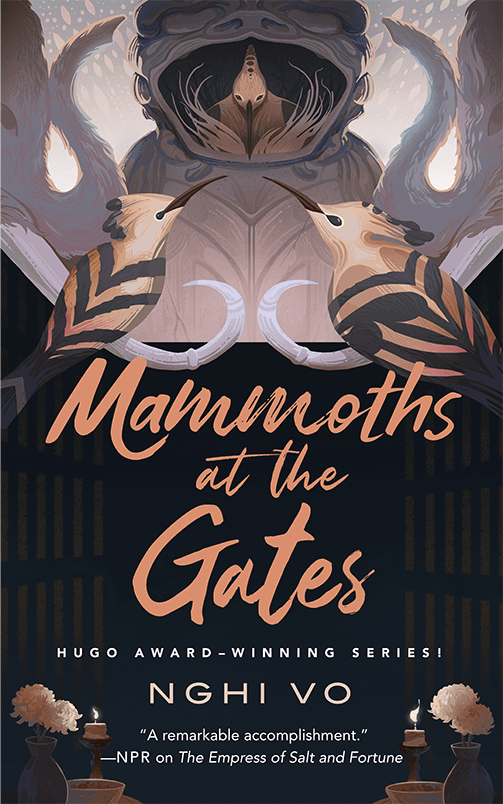enne📚 reviewed Mammoths at the Gates by Nghi Vo (The Singing Hills Cycle, #4)
Mammoths at the Gates
5 stars
This is easily my favorite book in the Singing Hills cycle. Cleric Chih goes back home to Singing Hills abbey, and the reader finally gets to see it in person with all of its neixin and politics. There's something about having this book set in Singing Hills that makes it a lot more grounded than the other one-off travel pieces. I love Chih coming back to their friend Ru, now acting Divine of the abbey, and having to renegotiate what their friendship looks like after so much time and change on both of their parts.
But, it's also a book about grief and transformation and the way we know others through stories. I love how the theme of change weaves throughout--it makes an ending that could have felt too pat instead resonate in a thematically satisfying way.
(One nice thing about a series of novellas that can be read in any order is that if you miss one, you're not lost. On the other hand, HYPOTHETICALLY SPEAKING it's easy to go read book five and then remember you never read book four. Just saying.)
"Will I dishonor Cleric Thien's memory, their chosen life and their work, and allow them to be buried under a name that is no longer their own? Is that what you are asking me?"
This is a bonus gender observation, but one thing that works really well for me specifically and that intersects neatly with the themes of change and grief is that the core of this story is a conflict over identity and deadnaming[*]. Cleric Chih comes back to find that the old Divine, Cleric Thien, has died. Thien's grandchildren have come along with mammoths to forcibly take Thien's body back home with them, while Singing Hills wants the body to stay and honor Thien's life work as a cleric.
Despite all clerics using they/them pronouns, these grandchildren Tui In Hao and Vee In Yee both continually refer to Cleric Thien as "grandfather" and "he" throughout. They also go out of their way to deride Cleric Thien's award-winning scholarly work (with a side of fantasy racism). If this conflict over identity wasn't clear enough (or for readers who maybe aren't hyperaware of pronouns and gendered language), Cleric Chih even explicitly chides these two that Thien was "not a man, a cleric".
[*] A tangent tangent, but I mean deadnaming here in what feels to me to be the original sense of the term--it's not just using the wrong name under any circumstance, but more specifically it's the threat of being buried and eulogized under the wrong name by spiteful and unsupportive family.

